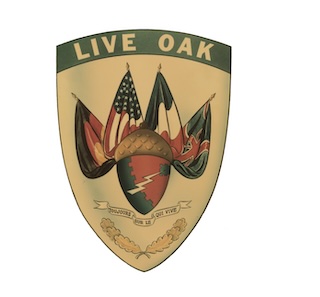The ‘Live Oak’ workshop is part of a multi-annual research seminar on ‘European Nuclear Trajectories’ and invites a small group of students to learn about research through research, with the students potentially getting involved in publication projects.
On 8 April, the students attended a research workshop with five researchers and took part in question-and-answer sessions. Frédéric Gloriant, director of CIENS, is coordinating the seminar with Yannick Pincé, associate researcher, contemporary historian and specialist in French nuclear history.
The Live Oak group was founded in April 1959, at the height of the Second Berlin Crisis. Triggered a few months earlier by Khrushchev, who wanted to get rid of the Allied military presence in the western sectors of Berlin, the crisis continued until 1963. Live Oak was made up of officers from the three Western powers that had guaranteed the status of the Berlin enclave: the United States, France and the United Kingdom. From 1961 onwards, officers from the Federal Republic of Germany joined the group. Its aim was to plan crisis scenarios, military measures to maintain or re-establish access to West Berlin, and other political and economic retaliatory measures in the event of a new USSR blockade.
The aim of looking back at the creation and operation of this planning group is to launch a collective study of the little-documented history of Live Oak, which continued to exist until the end of the Cold War. The aim is to produce a truly multilateral approach to the emergency planning that took place in this very specific body.
The questions underlying this seminar :
- Was Live Oak a place where a nuclear crisis (the Second Berlin Crisis) was managed in a truly multilateral way (in fact, tri- then quadri-lateral, when West Germany was associated with the group)?
- To what extent did Live Oak contribute to a mutually beneficial strategic dialogue between the USA, France, the UK and West Germany in the late 1950s and early 1960s?
PROGRAMME OF THE AFTERNOON
13.45 – 15.45 : first panel
Susan Colbourn (Duke University): The United States and the Origins of LIVE OAK
Frédéric Gloriant (ENS-PSL, CIENS): France and Live Oak: All Talk and No Action?
Jeffrey Michaels (King’s College London/Leiden University): The House Not Built: NATO Nuclear Use Authority and the Berlin Crisis
16.15 – 17.45 : second panel Yannick Pincé (ENS-PSL, CIENS): Live Oak, as a Laboratory of the Franco-American Strategic Schism
Andreas Lutsch (Federal University of Applied Administrative Sciences, Berlin): Toward A Four-Power War Council? Researching Live Oak’s Quadripartite- Dimension
17.45 – 18.00 : concluding discussion about the workshop and publication prospects
SHORT BIOS OF THE SPEAKERS
Susan Colbourn is associate research professor at the Sanford School of Public Policy and associate director of the Program in American Grand Strategy at Duke University. She is the author of Euromissiles: The Nuclear Weapons That Nearly Destroyed NATO (2022).
Dr. Frédéric Gloriant is Assistant Professor of Contemporary History and the Director of the CIENS (Interdisciplinary Centre for Strategic Studies) at the École Normale Supérieure, rue d’Ulm (ENS / PSL) and is a member of the IHMC (Institut d’histoire moderne et contemporaine). He has published various articles on the Franco-British relationship, on West European nuclear history and more broadly on the Cold War. He has co-edited a collective volume, France, Germany and Nuclear Deterrence: Quarrels and Convergences during the Cold War and Beyond (Berghahn, 2022) and published a book adapted from his PhD thesis, Le Schisme franco-britannique: de Suez au veto de 1963 (Presses universitaires de Rennes, 2023).
Dr. Andreas Lutsch is Juniorprofessor of Intelligence Analysis at the Federal University of Applied Administrative Sciences, Department of Bundesnachrichtendienst, Berlin. He currently teaches at the Federal University, in the BND’s analytic education program, at Sciences Po Paris, the University of Potsdam and the University of Bonn. Previously, he held positions at the Universities of Mainz and Würzburg and was a nuclear security postdoctoral fellow at Stanford University. Currently, he co-edits a book on the “The German Nuclear Question. An International History, 1955-1963” and contributes to an Occasional Paper on counterforce and US nuclear strategy, edited by Dr. Brad Roberts, LLNL-CGSR.
Dr Jeffrey Michaels holds Senior Visiting Fellowships at the King’s College London Centre for Science and Security Studies, the Oxford Changing Character of War Centre, and is an Associate Senior Research Fellow with RAND Europe. He is presently attached to the Institute of Political Science at Leiden University. In 2023-2024 he was the Senior Eisenhower Defense Fellow at the NATO Defense College in Rome. Earlier in his career he was the IEN Senior Fellow in American Foreign Policy and International Security at the Institut Barcelona d’Etudis Internacionals, and a Senior Lecturer in Defence Studies and Research Associate in War Studies at King’s. He has also served as an official with NATO and the US Department of Defense. His research covers the fields of war studies, nuclear strategy, deterrence, US foreign policy, NATO, intelligence, and Cold War history. He is the co-editor with Tim Sweijs of Beyond Ukraine: Debating the Future of War (2024), co-author with Lawrence Freedman of The Evolution of Nuclear Strategy, 4th Edition (2019), co-editor with Lawrence Freedman of Scripting Middle EastLeaders (2013), and author of The Discourse Trap and the US Military: From the War on Terror to the Surge (2013).
Yannick Pincé, is associate researcher at the CIENS (Centre interdisciplinaire sur les enjeux stratégiques, Interdisciplinary Centre for Strategic Studies), ENS-PSL, Paris. He is a historian (PhD university Sorbonne nouvelle) specialising in nuclear deterrence. His thesis, to be published in 2025, looks at the notion of nuclear ‘consensus’ in France.

